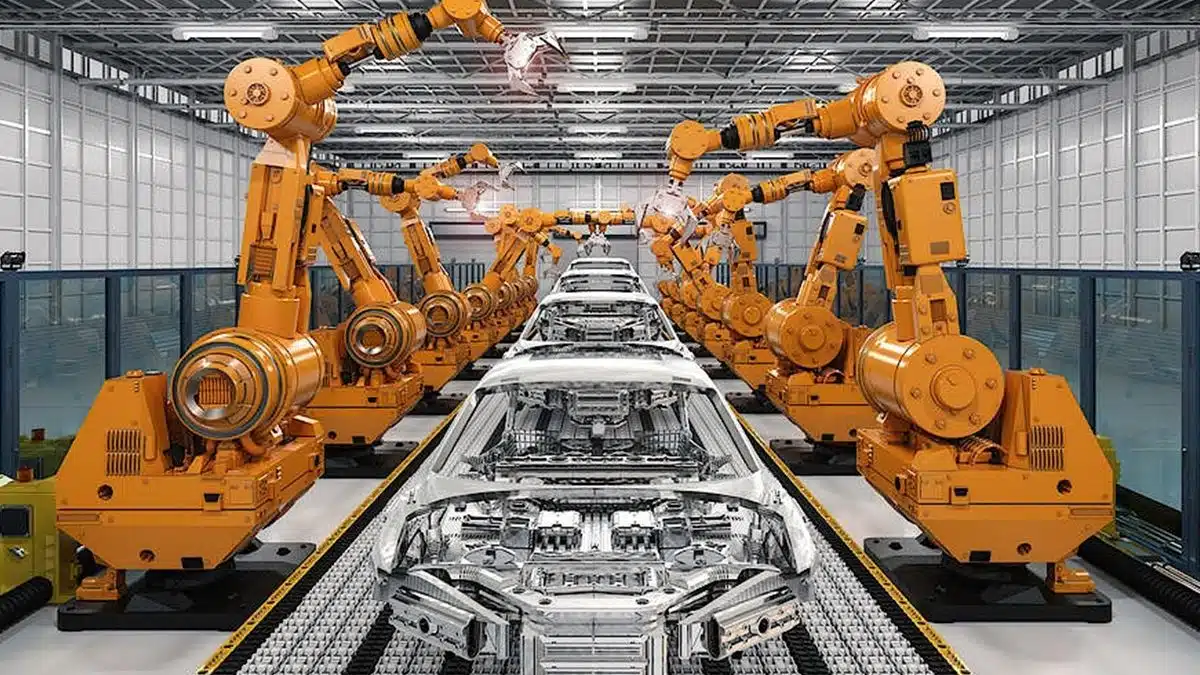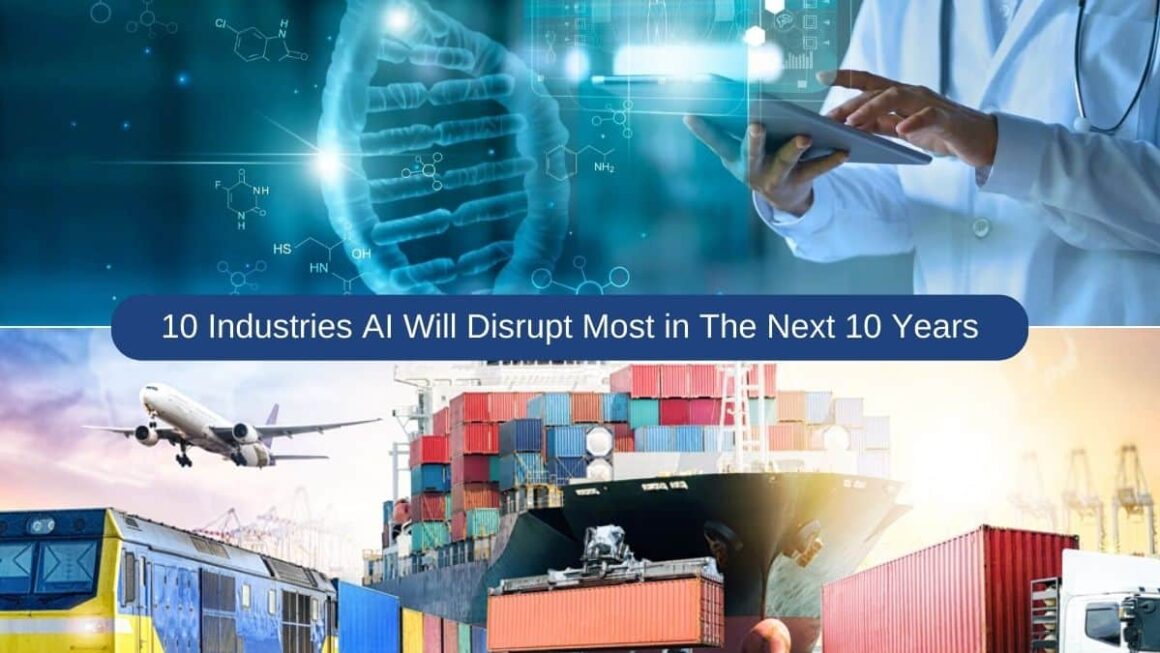Artificial Intelligence (AI) has emerged as a transformative force across various sectors, revolutionizing the way we live and work. In the coming decade, AI is predicted to disrupt numerous industries, leading to significant changes in healthcare, transportation and logistics, manufacturing and robotics, finance and banking, retail and e-commerce, customer service and support, agriculture and farming, energy and utilities, education and e-learning, as well as legal services and law enforcement. Today in this article we will be talking about 10 Industries AI Will Disrupt Most in The Next 10 Years.
10 Industries AI Will Disrupt Most in The Next 10 Years
Healthcare

Artificial intelligence (AI) is poised to revolutionize the healthcare industry over the next 10 years, bringing about significant disruptions in various areas. AI technologies have the potential to enhance diagnostics, improve patient care, streamline administrative tasks, and advance medical research and drug development. The integration of AI into healthcare systems can lead to more efficient and personalized healthcare delivery, ultimately improving patient outcomes and reducing costs.
One area where AI is already making a profound impact is in medical diagnostics. AI algorithms can analyze vast amounts of medical data, including medical images, patient records, and genetic information, to assist in the early detection and diagnosis of diseases. AI-powered image recognition systems can accurately interpret medical scans, such as X-rays, MRIs, and CT scans, helping healthcare professionals detect abnormalities and identify potential diseases at an early stage. This early detection can lead to timely interventions and improved treatment outcomes.
In addition to diagnostics, AI can transform patient care by enabling personalized medicine. AI algorithms can analyze patient data, including genetic information, medical history, and lifestyle factors, to develop tailored treatment plans. This individualized approach can optimize treatment effectiveness and minimize adverse effects by accounting for each patient’s unique characteristics. AI-powered virtual assistants and chatbots can also provide patients with personalized recommendations, reminders, and support, enhancing patient engagement and adherence to treatment plans.
Administrative tasks and healthcare operations can also benefit from AI integration. AI-powered systems can automate routine administrative processes, such as appointment scheduling, billing, and documentation, reducing the burden on healthcare staff and improving efficiency. Natural language processing algorithms can analyze and extract relevant information from medical records, enabling faster and more accurate coding and billing. This automation of administrative tasks can free up healthcare professionals’ time, allowing them to focus more on direct patient care.
AI is also revolutionizing medical research and drug development. AI algorithms can analyze vast amounts of biomedical literature, scientific studies, and clinical trial data, helping researchers identify patterns, discover new drug targets, and predict treatment outcomes. By leveraging AI, drug discovery processes can be accelerated, leading to the development of novel therapies and the repurposing of existing drugs for new indications. AI can also facilitate the design of more efficient and targeted clinical trials, potentially reducing the time and cost required to bring new treatments to market.
Transportation and Logistics

With advancements in machine learning, deep learning, and data analytics, AI-powered solutions are set to optimize efficiency, enhance safety, reduce costs, and improve overall logistics operations. Bringing about significant disruptions and transforming the way goods and people are transported.
One major area where AI is expected to make a significant impact is in autonomous vehicles. Self-driving cars, trucks, and drones are already being developed and tested extensively, and they have the potential to reshape transportation systems. AI algorithms can analyze vast amounts of sensor data in real-time, enabling vehicles to make quick and informed decisions, navigate complex road conditions, and avoid accidents. As these technologies mature and gain regulatory approval, we can expect to see autonomous vehicles become more common, leading to increased safety and reduced traffic congestion.
AI can also enhance the efficiency of logistics operations. With the ability to process large volumes of data, AI algorithms can optimize route planning and scheduling, taking into account various factors such as traffic conditions, weather patterns, and delivery deadlines. By optimizing routes, AI can minimize fuel consumption, reduce transportation costs, and improve delivery times. Additionally, AI-powered predictive analytics can help logistics companies anticipate demand patterns, optimize inventory management, and streamline supply chain operations, leading to cost savings and improved customer satisfaction.
Manufacturing and Robotics

Another Industry were Artificial Intelligence (AI) is for sure going to impact big in next 10 years is Manufacturing and Robotics. With advancements in machine learning, computer vision, and natural language processing, AI technologies are becoming increasingly capable of automating complex tasks and improving overall efficiency. Here are some key areas where AI is expected to have a transformative impact:
- Automation and Robotics: AI will play a central role in advancing automation and robotics in manufacturing. Intelligent robots equipped with AI algorithms can handle intricate tasks that previously required human intervention. These robots can perform repetitive assembly line work, precision machining, and even complex tasks that demand cognitive abilities. AI-powered robotics will enhance production speed, accuracy, and safety, leading to increased productivity and cost savings for manufacturers.
- Predictive Maintenance: AI algorithms can analyze large volumes of sensor data from machinery and equipment to detect patterns and predict maintenance requirements. By implementing predictive maintenance systems, manufacturers can reduce unplanned downtime, optimize equipment lifecycles, and minimize maintenance costs. AI-driven predictive maintenance also enables condition-based monitoring, where machines are monitored in real-time to identify anomalies and potential failures, ensuring proactive interventions and minimizing disruptions.
- Quality Control and Defect Detection: AI technologies such as computer vision can revolutionize quality control processes in manufacturing. Computer vision systems equipped with AI algorithms can inspect products for defects with high precision and speed, surpassing human capabilities. By analyzing images or videos, AI systems can detect imperfections, inconsistencies, or deviations in product quality, allowing manufacturers to take immediate corrective actions. This leads to improved product quality, reduced waste, and enhanced customer satisfaction.
- Supply Chain Optimization: AI can optimize the complex supply chains that support manufacturing operations. Machine learning algorithms can analyze vast amounts of data related to inventory levels, demand patterns, transportation logistics, and market trends. By leveraging this data, AI can generate accurate demand forecasts, optimize inventory management, streamline logistics operations, and enable proactive decision-making. These AI-powered optimizations enhance supply chain efficiency, reduce costs, and minimize delays, leading to improved overall performance.
- Enhanced Human-Machine Collaboration: AI technologies are not solely focused on replacing human workers but also enhancing their capabilities. Collaborative robots, also known as cobots, are designed to work alongside humans, leveraging AI to assist in tasks that require strength, precision, or cognitive abilities. AI-powered cobots can perform intricate assembly tasks with human-like dexterity, providing assistance and augmenting human capabilities. This collaboration between humans and AI-driven robots leads to improved productivity, increased safety, and more fulfilling work environments.
- Data-Driven Decision Making: AI enables manufacturers to leverage the wealth of data generated within their operations to make informed decisions. By analyzing historical and real-time data, AI algorithms can identify trends, patterns, and correlations that might go unnoticed by human analysts. This data-driven approach allows manufacturers to optimize production processes, identify bottlenecks, reduce waste, and make accurate demand forecasts. Ultimately, AI empowers decision-makers with actionable insights, leading to more efficient operations and better business outcomes.
Finance and Banking

AI has the potential to revolutionize various aspects of financial services, from customer interactions to risk management and fraud detection. With its ability to process vast amounts of data, identify patterns, and make intelligent decisions AI can do tasks that are otherwise impossible or takes lot of efforts to do.
Most significant impacts of AI in the finance and banking industry will be on customer interactions and personalized experiences. AI-powered chatbots and virtual assistants can provide round-the-clock customer support, answering queries, and assisting with routine transactions. These AI systems can analyze customer data and preferences to offer tailored recommendations for financial products and services, helping customers make more informed decisions. By leveraging natural language processing and machine learning algorithms, AI can enhance customer engagement and satisfaction, creating a more seamless and personalized banking experience.
AI is also set to transform risk management in the finance industry. Traditional risk models rely on historical data and predefined rules, which may not capture the complexities and evolving nature of financial markets. AI algorithms can analyze vast amounts of real-time data, including market trends, news articles, and social media sentiment, to identify emerging risks and make predictive assessments. By continuously learning and adapting to new information, AI-powered risk management systems can provide more accurate and timely risk assessments, enabling financial institutions to make better-informed decisions and mitigate potential losses.
Retail and E-commerce

Over the next 10 years, AI is expected to disrupt the retail and e-commerce industry in several significant ways. One of the major areas where AI will have a profound impact is in customer service and support. AI-powered chatbots and virtual assistants are already being used by many retailers and e-commerce platforms to provide instant and personalized assistance to customers. These virtual agents can handle a wide range of customer inquiries, provide product recommendations, and assist with order tracking and returns.
AI will also revolutionize the way customers discover and purchase products. Recommendation systems powered by AI algorithms will become increasingly precise in understanding customer preferences and behavior, allowing for highly personalized product suggestions. These recommendation engines will consider factors such as browsing history, purchase history, and even external data sources like social media activity to provide tailored recommendations. As a result, customers will have more relevant and engaging shopping experiences, leading to increased conversions and customer loyalty.
Inventory management and supply chain optimization will be another area significantly disrupted by AI. Retailers and e-commerce companies deal with vast amounts of data related to inventory levels, demand forecasting, and logistics. AI algorithms can analyze this data to identify patterns and make accurate predictions about demand, allowing businesses to optimize inventory levels and minimize stockouts or overstock situations. AI-powered systems can also optimize logistics operations, routing deliveries more efficiently and reducing transportation costs. By leveraging AI in inventory management and supply chain optimization, retailers can streamline their operations and ensure better customer satisfaction through improved product availability and faster deliveries.
Agriculture and Farming

AI holds immense potential to revolutionize traditional farming practices, optimize resource allocation, and address various challenges faced by the industry. By leveraging AI advancements, farmers and agricultural businesses can expect significant advancements in several key areas.
Through the use of AI-powered analytics and machine learning algorithms, farmers can gather and analyze vast amounts of data related to soil composition, weather patterns, crop health, and historical yield data. By processing and interpreting this data, AI systems can provide valuable insights and recommendations regarding the optimal timing for planting, irrigation, fertilization, and harvesting. This level of precision and data-driven decision-making enables farmers to maximize crop yields, minimize resource wastage, and ultimately increase overall productivity.
With the integration of AI technologies, farms can utilize autonomous vehicles, drones, and robotics for various tasks such as planting, harvesting, and crop monitoring. These AI-driven machines can perform labor-intensive operations with unparalleled accuracy and efficiency. Through computer vision and machine learning algorithms, these machines can identify and respond to specific plant health issues, detect pests or diseases, and take appropriate actions. By automating routine tasks, farmers can optimize labor usage, reduce operational costs, and achieve higher levels of productivity.
Energy and Utilities

AI also holds great promise for improving the efficiency of energy distribution and consumption. Smart grids powered by AI algorithms can monitor and analyze real-time data from sensors placed throughout the grid, allowing for better management of electricity supply and demand. This can lead to more efficient energy distribution, reduced transmission losses, and improved grid stability. AI can also enable demand response systems, where consumers can adjust their energy usage based on real-time pricing information, helping to balance the grid and reduce peak loads.
AI algorithms can optimize the placement and operation of wind turbines and solar panels, maximizing their output based on factors such as weather patterns, energy demand, and grid stability. This level of optimization can lead to increased renewable energy capacity and reduced reliance on fossil fuels, ultimately driving the transition to a cleaner and more sustainable energy mix.
Education and E-Learning

AI can personalize education by tailoring learning materials to individual students’ needs and learning styles. Artificial Intelligence can also reduce the work of teachers and improve the teaching methods which directly help students in learning. Here are some of the key areas where AI is making an impact:
- Personalized learning: AI can provide personalized learning experiences by analyzing data on individual students’ strengths, weaknesses, learning styles, and preferences. It can adapt the curriculum, pace, and content to meet the specific needs of each student, enhancing their learning outcomes.
- Intelligent tutoring systems: AI-powered intelligent tutoring systems can provide personalized guidance and support to students. These systems can analyze student performance, provide feedback, and offer targeted recommendations for improvement. They can simulate one-on-one interactions with human tutors, providing assistance and answering questions.
- Automated grading and feedback: AI can automate the grading process, saving teachers’ time and providing immediate feedback to students. Machine learning algorithms can evaluate assignments, quizzes, and exams, reducing the burden of manual grading. This allows teachers to focus on more meaningful tasks like providing personalized instruction and support.
- Content creation and curation: AI can generate educational content, such as quizzes, exercises, and study materials. It can also curate existing educational resources, selecting and organizing them based on relevance and quality. AI algorithms can analyze large amounts of data and recommend suitable learning materials to students and educators.
- Virtual assistants and chatbots: AI-powered virtual assistants and chatbots can provide 24/7 support to students. They can answer common questions, provide explanations, and offer guidance on various topics. These AI assistants can create a more interactive and engaging learning environment, fostering student engagement and motivation.
- Adaptive learning platforms: AI can power adaptive learning platforms that continuously monitor students’ progress and adapt the learning experience accordingly. These platforms can dynamically adjust the difficulty level, pace, and content to challenge and engage students at their individual skill levels.
- Data analytics and predictive modeling: AI algorithms can analyze vast amounts of educational data, including student performance, attendance, and engagement. This data can help identify patterns, predict student outcomes, and provide early interventions to prevent academic challenges. Educators can use these insights to make data-driven decisions and provide targeted support to students.
Legal Services and Law Enforcement

AI can assist in legal research, analyzing vast amounts of data to support legal professionals in building cases. Here are some ways in which AI is expected to bring about significant changes:
- Document review and analysis: AI-powered systems can quickly review and analyze vast amounts of legal documents, contracts, and case files. Natural Language Processing (NLP) techniques enable machines to understand and extract relevant information from text, helping lawyers save time and improve accuracy in legal research, due diligence, and contract analysis.
- Legal research: AI can assist legal professionals by automating legal research tasks. AI-based platforms can analyze and organize legal precedents, statutes, regulations, and case law. These tools can provide quick access to relevant information, improve the efficiency of legal research, and help lawyers make more informed decisions.
- Predictive analytics: AI algorithms can analyze historical case data to identify patterns and trends. By leveraging machine learning, legal professionals can gain insights into the potential outcomes of cases, identify risks, and develop better strategies for their clients. Predictive analytics can also help in predicting litigation costs, settlement values, and the likelihood of success in legal matters.
- Contract analysis and drafting: AI can streamline the contract analysis and drafting process. AI-powered systems can review contracts, identify potential issues, highlight critical clauses, and suggest improvements or alternative clauses. This can help lawyers save time and ensure that contracts are thorough, accurate, and comply with legal requirements.
- Law enforcement and crime prevention: AI can be used to analyze large volumes of data, such as surveillance footage, social media posts, and criminal records, to identify patterns, detect potential threats, and aid in crime prevention. Facial recognition technology can be used to identify suspects or missing persons, while predictive policing algorithms can help allocate law enforcement resources more effectively.
- E-discovery and litigation support: AI-powered tools can automate the e-discovery process by scanning and categorizing large volumes of electronic data, including emails, documents, and multimedia files. This can significantly reduce the time and cost associated with e-discovery, making the process more efficient and accurate.
Customer Service and Support

Use of AI will allow companies to proactively address customer concerns and improve products or services. AI chatbots can offer personalized product recommendations based on customer preferences and purchase history, enhancing the overall customer experience.
- Chatbots and virtual assistants: AI-powered chatbots and virtual assistants are already being widely used in customer service. These intelligent systems can handle a variety of customer inquiries, providing instant responses and solutions. As AI continues to advance, chatbots will become even more sophisticated, with improved natural language processing and understanding capabilities.
- Personalized customer experiences: AI enables businesses to gather and analyze large amounts of customer data to create personalized experiences. By leveraging machine learning algorithms, AI can identify patterns, preferences, and behavior to offer tailored recommendations and suggestions. This personalization improves customer satisfaction and loyalty.
- Faster response times: With AI, customer service departments can automate routine tasks and processes, allowing agents to focus on more complex issues. AI algorithms can quickly analyze customer inquiries, classify them, and provide suggested solutions to human agents. This speeds up response times, reduces waiting periods, and enhances overall customer experience.
- 24/7 support: AI-powered chatbots and virtual assistants can provide round-the-clock customer support. Customers can get assistance at any time, regardless of business hours, which increases convenience and customer satisfaction.
- Self-service options: AI enables the development of self-service portals and knowledge bases that empower customers to find solutions to their problems independently. AI algorithms can recommend relevant articles, FAQs, and tutorials based on the customer’s specific query, reducing the need for direct interaction with customer service agents.
- Sentiment analysis: AI can analyze customer feedback, reviews, and social media mentions to determine customer sentiment and identify potential issues. This allows businesses to proactively address concerns, improve products or services, and enhance customer satisfaction.
- Predictive analytics: AI can analyze historical customer data and predict future trends and behavior. This helps businesses anticipate customer needs, offer proactive support, and identify cross-selling or upselling opportunities.
- Language translation: AI-powered language translation tools can break down language barriers and facilitate communication with customers from different linguistic backgrounds. This enables businesses to provide multilingual support and expand their customer base globally.
Also Read: How ChatGPT is Transforming Education for Students and Teachers




